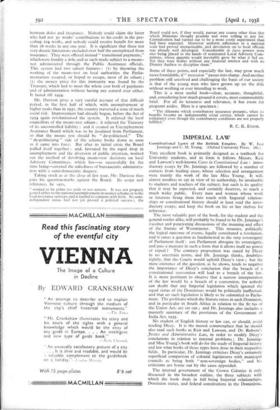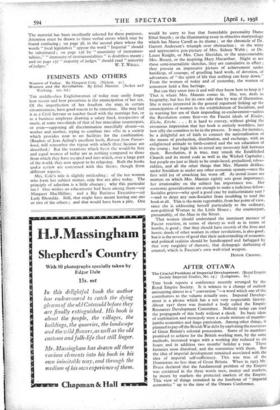IMPERIAL LAW
Constitutional Laws of the British Empire. By W. Ivor Jennings and C. M. Young. (Oxford University Press. as.) THIS excellent book is primarily designed as a textbook for University students, and in form it follows Messrs. Keir and Lawson's well-known Cases in Constitutional Law : intro- ductory essays by Dr. Jennings are followed by a number of extracts from leading cases, whose selection and arrangement were mainly the work of the late Miss Young. It will, almost needless to say in view of its authorship, be invaluable to students and teachers of the subject, but such is its quality that it may be expected, and certainly deserves, to reach a much wider public. Every man and woman whose work or interests bring them into touch with Imperial relation- ships or constitutional history should at least read the intro- ductory essays, and keep the book on his or her shelves for reference.
The most valuable part of the book, for the student and the general reader alike, will probably be found to be Dr. Jennings's succinct and penetrating discussions of the meaning and effect of the Statute of Westminster. This measure, politically the logical outcome of events, legally constituted a revolution, and it raises a question as fundamental as the very sovereignty of Parliament itself : can Parliament abrogate its sovereignty, and pass a measure in such a form that it allows itself no power of repeal ? The contrary proposition was stated by Dicey in no uncertain terms, and Dr. Jennings thinks, doubtless rightly, that the Courts would uphold Dicey's view ; but the mere existence of the question, as he shows, tends to negative the importance of Dicey's conclusion that the breach of a constitutional convention will lead to a breach of the law. It is more pertinent to observe that a narrow interpretation of the law would be a breach of a convention, for nobody can doubt that any Imperial legislation which ignored the equal status of the Dominions would be politically ineffectual, and that no such legislation is likely to be submitted to Parlia- ment. The problems which the Statute raises in each Dominion, and in particular in South Africa in relation to the St-lus of the Union Act, are set out ; and Dr. Jennings also includes a masterly summary of the provisions of the Government of India Act, 1935.
No student of English history or law can, or should, avoid reading Dicey. It is the merest commonplace that he should also read such books as Keir and Lawson, and Dr. Robson's justice and Administrative Law, in order to modify Dicey's conclusions in relation to internal problems ; Dr. Jennings and Miss Young's book will do for the study of Imperial history and law what books of those types have done in their respective fields. In particular, Dr. Jennings criticises Dicey's extremely superficial comparison of colonial legislatures with municipal councils as being both " non-sovereign bodies," and his criticisms are borne out by the cases appended.
The internal government of the Crown Colonies is only discussed in the broadest outline, the three subjects with which the book deals in full being Imperial relationships, Dominion status, and federal constitutions in the Dominions.
The material has been excellently selected for these purposes. Attention must be drawn to three verbal errors which may be found confusing ; on page 38, in the second place where the words " local legislation " appear the word " Imperial " should be substituted ; on page 136 by " unanimity of instrumen- talities," " immunity of instrumentalities " is doubtless meant ; and on page 137 " majority of judges " should read " minority















































 Previous page
Previous page